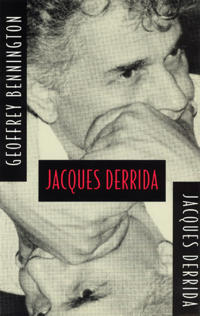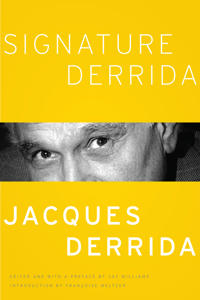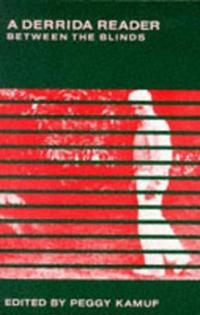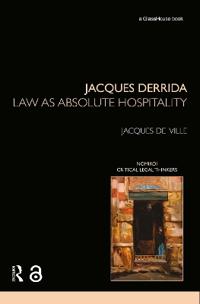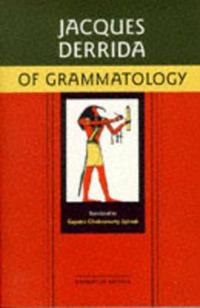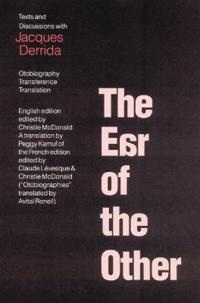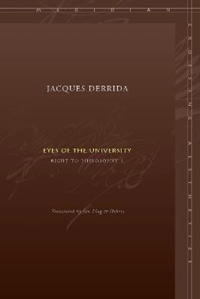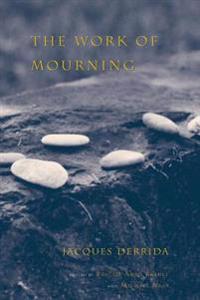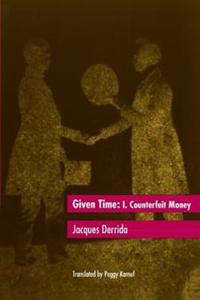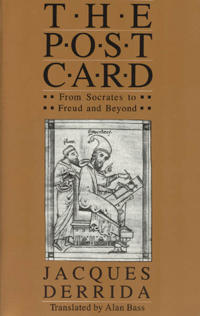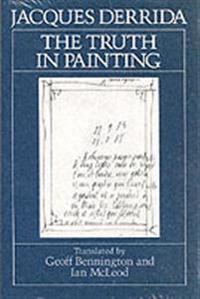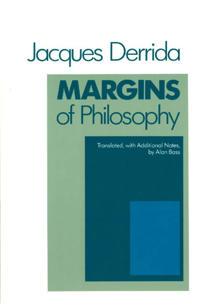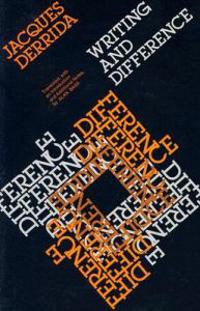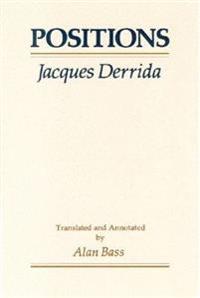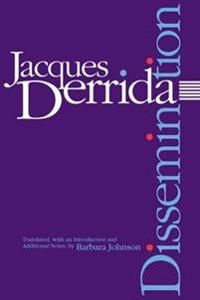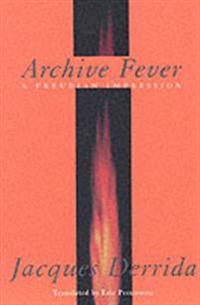Jacques Derrida (Häftad)
avGeoffrey Bennington, Jacques Derrida
ISBN: 9780226042626 - UTGIVEN: 199907Geoffrey Bennington sets out here to write a systematic account of the thought of Jacques Derrida. Responding to Bennington's text at every turn is Derrida's own, excerpts from his life and thought that resist circumscription. Together these texts, as a dialogue and a contest, constitute a critical [...]
Signature Derrida (Häftad)
avJacques Derrida
ISBN: 9780226924540 - UTGIVEN: 201305Throughout his long career, Jacques Derrida had a close, collaborative relationship with "Critical Inquiry" and its editors. He saved some of his most important essays for the journal, and he relished the ensuing arguments and polemics that stemmed from the responses to his writing that "Critical In[...]
A Derrida Reader (Häftad)
avJacques Derrida
ISBN: 9780231066594 - UTGIVEN: 199104Jacques Derrida is one of the most prolific and influential contemporary French intellectuals. Twenty-two essays and excerpts from Derrida's writings over the last twenty-five years are gathered in this accessible introduction, A Derrida Reader. The book's five sections are carefully introduced by [...]
Jacques Derrida (Häftad)
avJacques De Ville
ISBN: 9780415821490 - UTGIVEN: 201211Jacques Derrida: Law as Absolute Hospitality presents a comprehensive account and understanding of Derrida's approach to law and justice. Through a detailed reading of Derrida's texts, Jacques de Ville contends that it is only by way of Derrida's deconstruction of the metaphysics of presence, and sp[...]
The Gift of Death / Literature in Secret (Pocket)
avJacques Derrida, David Wills, Jacques Derrida
ISBN: 9780226142777 - UTGIVEN: 200804"The Gift of Death", Jacques Derrida's most sustained consideration of religion, explores questions first introduced in his book "Given Time" about the limits of the rational and responsible that one reaches in granting or accepting death, whether by sacrifice, murder, execution, or suicide. Derrida[...]
Of Grammatology (Pocket)
avJacques Derrida, Gayatri Chakravorty Spivak, Jacques Derrida
ISBN: 9780801858307 - UTGIVEN: 199801Jacques Derrida's revolutionary theories about deconstruction, phenomenology, psychoanalysis, and structuralism, first voiced in the 1960s, forever changed the face of European and American criticism. The ideas in De la grammatologie sparked lively debates in intellectual circles that included stud[...]
The Ear of the Other (Pocket)
avJacques Derrida, Christie McDonald, Jacques Derrida
ISBN: 9780803265752 - UTGIVEN: 198812"Originally published in French in 1982, this collection is a good representation of the range of Derrida's working styles."--South Atlantic Review[...]
On the Name (Pocket)
avJacques Derrida, Thomas (EDT) Dutoit, Jacques Derrida
ISBN: 9780804725552 - UTGIVEN: 1995-08"The name: What does one call thus? What does one understand under the name of name? And what occurs when one gies a name? What does one give then? One does not offer a thing, one delivers nothing, and still something comes to be, which comes down to giving that which one does not have, as Plotinus [...]
Eyes of the University (Pocket)
avJacques Derrida, Jan (TRN) Plug, Jacques Derrida
ISBN: 9780804742979 - UTGIVEN: 2004-09Completing the translation of Derrida's monumental work Right to Philosophy (the first part of which has already appeared under the title of Who's Afraid of Philosophy?), Eyes of the University brings together many of the philosopher's most important texts on the university and, more broadly, on the[...]
Positions (Pocket)
avJacques Derrida, Alan Bass, Jacques Derrida
ISBN: 9780826477118 - UTGIVEN: 200412This new edition of a key, accessible text to the work of the most influential psychoanalytic and literary critic alive today includes a new introduction by Christopher Norris setting these key early interviews in the context of the full trajectory of Derrida's thought.[...]
Islam and the West: A Conversation with Jacques Derrida (Inbunden)
avCherif, Mustapha
ISBN: 9780226102863 - UTGIVEN: 2008-10-17In the spring of 2003, Jacques Derrida sat down for a public debate in Paris with Algerian intellectual Mustapha Chérif. The eminent philosopher arrived at the event directly from the hospital where he had just been diagnosed with pancreatic cancer, the illness that would take his life just ove[...]
The Work of Mourning (Pocket)
avJacques Derrida, Pascale-Anne Brault, Michael Naas
ISBN: 9780226142814 - UTGIVEN: 200309One must go before the other. This inevitability bestows upon the mourner a further inevitability - to say something and to participate in the codes and rites of mourning. The distinguished French philosopher Jacques Derrida has been forced to wrestle with the complexities of mourning, as colleagues[...]
Memoirs of the Blind (Pocket)
avJacques Derrida, Pascale-Anne Brault, Michael Naas
ISBN: 9780226143088 - UTGIVEN: 199306In this brilliant essay, Jacques Derrida explores issues of vision, blindness, self-representation, and their relation to drawing, while offering detailed readings of an extraordinary collection of images. Selected by Derrida from the prints and drawings department of the Louvre, the works depict bl[...]
Given Time (Häftad)
avJacques Derrida
ISBN: 9780226143149 - UTGIVEN: 199406Is "giving" possible? Is it possible to give without immediately entering into a circle of exchange that turns the gift into a debt to be returned? This question leads Jacques Derrida to make out an irresolvable paradox at what seems the most fundamental level of the gift's meaning: for the gift to [...]
Of Spirit (Pocket)
avJacques Derrida, Geoffrey Bennington, Rachel Bowlby
ISBN: 9780226143194 - UTGIVEN: 199104"Will a more important book on Heidegger appear in our time? No, not unless Derrida continues to think and write in his spirit. . . . Let there be no mistake: this is not merely a brilliant book on Heidegger, it is thinking in the grand style."--David Farrell Krell,; IResearch in Phenomenology; X[...]
The Postcard (Häftad)
avJacques Derrida
ISBN: 9780226143224 - UTGIVEN: 198706You were reading a somewhat retro loveletter, the last in history. But you have not yet received it. Yes, its lack or excess of address prepares it to fall into all hands: a post card, an open letter in which the secret appears, but indecipherably. You can take it or pass it off, for examplle, as a [...]
The Truth in Painting (Häftad)
avJacques Derrida
ISBN: 9780226143248 - UTGIVEN: 1987-07"The four essays in this volume constitute Derrida's most explicit and sustained reflection on the art work as pictorial artifact, a reflection partly by way of philosophical aesthetics (Kant, Heidegger), partly by way of a commentary on art works and art scholarship (Van Gogh, Adami, Titus-Carmel).[...]
Margins of Philosophy (Inbunden)
avJacques Derrida
ISBN: 9780226143262 - UTGIVEN: 198402"In this densely imbricated volume Derrida pursues his devoted, relentless dismantling of the philosophical tradition, the tradition of Plato, Kant, Hegel, Nietzsche, Husserl, Heidegger--each dealt with in one or more of the essays. There are essays too on linguistics (Saussure, Benveniste, Austin) [...]
Writing and Difference (Häftad)
avJacques Derrida
ISBN: 9780226143293 - UTGIVEN: 1980021. Force and Signification2. Cogito and the History of Madness3. Edmond Jabes and the Question of the Book4. Violence and Metaphysics: An Essay on the Thought of Emmanuel Levinas5. "Genesis and Structure" and Phenomenology6. La parole soufflee7. Freud and the Scene of Writing 8. The Theater of Cruel[...]
Spurs (Häftad)
avJacques Derrida
ISBN: 9780226143330 - UTGIVEN: 198102Derrida's controversial "deconstructions" of Nietzsche's meaning
Dissemination (Häftad)
avJacques Derrida
ISBN: 9780226143347 - UTGIVEN: 1983-02"The English version of "Dissemination" is] an able translation by Barbara Johnson . . . . Derrida's central contention is that language is haunted by dispersal, absence, loss, the risk of unmeaning, a risk which is starkly embodied in all writing. The distinction between philosophy and literature [...]
Archive Fever (Häftad)
avJacques Derrida
ISBN: 9780226143675 - UTGIVEN: 199810In this work, Jacques Derrida guides the reader through an extended meditation on remembrance, religion, time, and technology - all occasioned by a deconstructive analysis of the notion of archiving. The archival concept has played a pivotal role in numerous critical debates - a place of origin, yet[...]
The Beast & the Sovereign (Inbunden)
avJacques Derrida, Michel Lisse, Marie-Louise Mallet
ISBN: 9780226144283 - UTGIVEN: 200911When he died in 2004, Jacques Derrida left behind a vast legacy of unpublished material, much of it in the form of written lectures. With "The Beast and the Sovereign, Volume I", the University of Chicago Press inaugurated an ambitious series, edited by Geoffrey Bennington and Peggy Kamuf, translati[...]
The Beast and the Sovereign (Häftad)
avJacques Derrida
ISBN: 9780226144290 - UTGIVEN: 201112When he died in 2004, Jacques Derrida left behind a vast legacy of unpublished material, much of it in the form of written lectures. With "The Beast and the Sovereign, Volume I", the University of Chicago Press inaugurated an ambitious series, edited by Geoffrey Bennington and Peggy Kamuf, translati[...]

